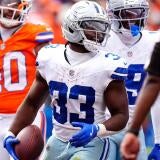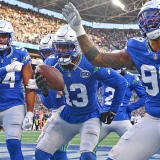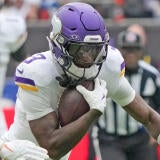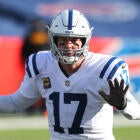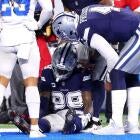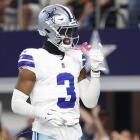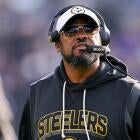Madden NFL 26 season simulation: Hail Mary wins Super Bowl LX; Eagles implode and Jaxson Dart breaks out
Here's how Madden NFL 26 sees the 2025 season shaking out

It's that time of the year again when NFL fans can gear up for the upcoming regular season by playing the latest installment of Madden NFL. As of Thursday, Madden NFL 26 is now officially available to everyone, and this latest installment of the legacy video game doesn't disappoint, particularly in giving us some fantastic storylines in our annual season-long simulation.
You know the drill by now: I download the latest rosters, wind up the game, sit back, and watch how the 2025 season unfolds in the eyes of Madden NFL 26. Of course, we go by the honor system here, and you'll just have to take my word that this was the lone simulation conducted. That said, I wouldn't blame you if you thought that I went through it a couple of times before getting a worthwhile season to write about, especially considering the 2025 season this simulation spit out. Hand to God, this was a one-off attempt.
On top of revealing where teams finished during the year, we'll tell you who ended up with some hardware, like NFL MVP and Coach of the Year, among other awards. We'll also highlight some notable items that occurred throughout the campaign as well before diving into the playoff bracket and, of course, Super Bowl LX.
Regular-season standouts
One of the big storylines coming into the 2025 season centers around some young quarterbacks. With that in mind, I made it a point to check in on some signal-callers like Cleveland Browns rookie Shedeur Sanders and New York Giants first-rounder Jaxson Dart, who both found their way atop their respective depth charts as QB1.

Sanders did not earn the Week 1 job for the Browns in this simulation, but got there eventually. After the team stumbled out to an 0-7 start, Kevin Stefanski turned the keys over to Sanders. Initially, it looked like the move was going to change the fortunes of the franchise as Sanders led the Browns to their first win of the season in his first start, edging out the New England Patriots in Foxborough, 25-24. There, he threw for 252 yards, two touchdowns and two interceptions.
That trip to the winner's circle was short-lived, however, as the Browns went 1-8 after that victory to finish with a league-worst 2-15 record overall. Still, it was a solid showing for Sanders, especially with his eye-popping 83.3 completion percentage upon gaining the starting job.

As for the Giants, they started 0-4 to begin the season and went 5-6 overall with Russell Wilson through the first 11 weeks of the year. After that, Dart took over at quarterback beginning in Week 12. Immediately, he led the Giants to an upset win over the Detroit Lions on the road. In that 31-24 win, Dart threw for 260 yards, three touchdowns, and one interception. After coming back down to earth a bit and losing the next two weeks (Week 13 at New England and Week 16 vs. Washington), Dart bounced back nicely, spearheading three straight wins to help New York crash the playoff picture as the No. 7 seed in the NFC.
In his six total starts, Dart threw for 1,353 yards, seven touchdowns, three interceptions and completed 72% of his throws.

Meanwhile, things weren't as rosy for the other New York club. It was a rough first season for Justin Fields and the Jets. The club finished 4-13 over the course of the regular season, which was tied for the second-worst record in the league and found them dead last in the AFC East. As for Fields, he battled turnovers as his 20 interceptions led the NFL. Surprisingly, he also didn't make much of an impact on the ground, rushing for just 391 yards, one touchdown and one fumble.

New York's former quarterback, Aaron Rodgers, started white hot to begin his tenure with the Pittsburgh Steelers. Rodgers began the year 7-0, holding a perfect record up until they were shut out by the Indianapolis Colts of all teams. In that loss, Rodgers struggled, throwing two interceptions. Pittsburgh largely bounced back after that defeat, but did lose four of its final five games (including two to Baltimore) to lose its grip in the AFC North race. Despite another second-half stumble from Mike Tomlin's club, the Steelers finished the year 11-6 and made the playoffs as a wild-card entry. Rodgers finished his season throwing for 3,236 yards, 21 touchdowns and eight interceptions.
Philadelphia Eagles implosion

We are giving Philadelphia its own section because the defending Super Bowl champions had a season to forget after hoisting the Lombardi Trophy. Remarkably, the club imploded and finished with a 6-11 record, which found them in dead last in the NFC East. This wasn't due to any sort of meaningful injury, as Jalen Hurts played every regular-season game, as did Saquon Barkley, A.J. Brown and the other key members on the defensive side of the ball.
It was a nightmarish start to the regular season, losing the first three games of the season and four of their first five out of the gate. Things briefly seemed as if they may turn around heading into the Week 9 bye after the Eagles won two of their three matchups to inch closer to .500, but the floor fell out from under them following the week-long break. Philly went on to drop three straight, losing matchups at the Green Bay Packers in Week 10, vs. the Lions in Week 11, and then at the Dallas Cowboys in Week 12. That brought them to a 3-8 record and effectively buried any hope of a late-season rally.
Of course, if this were to actually happen, there'd be mass hysteria along the streets of Philadelphia, so, thankfully for Eagles fans, this is virtual reality rather than reality.
Award winners
It's worth noting that outside of Coach of the Year and Most Valuable Player, Madden does divide some awards between the two conferences at the end of the year, so we'll be doubling up here with those accolades.

MVP: Patrick Mahomes. Mahomes was dialed in on what would be his third career MVP season. The Chiefs quarterback led the NFL with 45 passing touchdowns, while finishing second in the league with 4,528 yards passing. He also tossed just eight interceptions and completed 73% of his throws, helping Kansas City to a 14-3 regular-season record, which was good for another AFC West title and the No. 1 seed in the conference.
Coach of the Year: Jim Harbaugh. In just his second season as coach of the Los Angeles Chargers, Harbaugh is bringing home some hardware. Harbaugh won Coach of the Year for the second time in his NFL career (last came in 2011) after the Chargers broke out with a 14-3 record. That was tied for the best record in the conference, but two of those three losses came against the Chiefs, which lost them the head-to-head tiebreaker and fell just short of the division and top seed in the AFC.
Offensive Player of the Year (AFC): Rashee Rice. Kansas City's young wideout burst onto the scene in 2025 by being the NFL's co-leader in receiving touchdowns, finding the end zone 19 times over the course of the season. Rice also added 81 catches and 1,408 yards receiving (third-most in the NFL).
Offensive Player of the Year (NFC): CeeDee Lamb. Lamb may not have had the same scoring production as Rice, but the Cowboys receiver did register 13 touchdowns in 2025. More importantly, he led all pass catchers with 1,437 yards receiving, and his 103 receptions were second in the NFL.

Defensive Player of the Year (AFC): T.J. Watt. You want to talk about dominance? Let's look at T.J. Watt's 2025 season in this simulation. Currently, Watt is knotted with former Giants great Michael Strahan for the single-season sack record, taking down the quarterback 22.5 times. Well, he knocked that record aside, finishing this campaign with 25.5 sacks, a new record. That helped him earn DPOY honors for the second time in his career. Maybe even more remarkable was that Watt had to beat out his fellow Steelers teammate, Alex Highsmith, who tallied 22.5 sacks.
Defensive Player of the Year (NFC): Zaven Collins. Collins' season wasn't as jaw-dropping as Watt's, but it was impressive nonetheless. He finished the year with 18.5 sacks, while totaling 73 tackles and two fumble recoveries.
Offensive Rookie of the Year (AFC): Ashton Jeanty. It was a stellar rookie season for the Las Vegas Raiders first-round pick. Jeanty finished with the fourth-most rushing yards in the league (1,372) and piled up 10 rushing touchdowns. He also added 30 receptions for 236 yards receiving.
Offensive Rookie of the Year (NFC): Matthew Golden. The Green Bay Packers finally investing a first-round pick on a wide receiver paid off immediately in 2025 with Golden. The former Texas star caught 90 balls for 1,039 yards and seven touchdowns. Those reception and receiving yard totals led the team, while his seven touchdowns co-led the Packers skill position group.
Defensive Rookie of the Year (AFC): Shemar Stewart. Cincinnati got solid production from its first-round pass rusher. Stewart totaled eight sacks on the year (nearly doubling his 4.5 sack total from his entire collegiate career) and added 59 tackles.
Defensive Rookie of the Year (NFC): Mykel Williams. The San Francisco 49ers found a star in Williams, who came just short of tying Jevon Kearse's rookie single-season sack record of 14.5. Williams finished the year with 13.5 sacks to go along with 61 tackles.
Playoff bracket

The most surprising element upon first looking at this simulated playoff picture was that two rookie quarterbacks were able to lead their respective teams to the postseason. We already noted the late-season heroics from Dart and propelling the New York Giants to the No. 7 seed in the NFC, but don't forget about the No. 1 overall pick from the 2025 NFL Draft in Cameron Ward. The Miami product led the Tennessee Titans to the AFC South title during his rookie season, putting together a rookie campaign where he threw for 3,422 yards, 25 touchdowns and 13 interceptions. Alas, while both of these rookies should be commended for taking their teams as far as they did, their magical run stopped in the first round of the playoffs. Tennessee was bounced by the Los Angeles Chargers, while the Giants were shown the door by the Los Angeles Rams.
And that brings us to the rest of the playoff slate, which is pretty standard for what you'd expect. For the second year in a row, the Washington Commanders sent home the Lions in the playoffs. Meanwhile, Buffalo took out Joe Burrow and the Bengals, and an AFC North slugfest saw the Ravens topple Aaron Rodgers and the Pittsburgh Steelers in the opening round.
Speaking of division rivals going head to head in the playoffs, the biggest story out of the divisional round comes from Arrowhead Stadium. After going 0-2 against the Kansas City Chiefs in the regular season, Jim Harbaugh led the Chargers to a 24-21 win over their division foes, sending the No. 1 seed home after a brief appearance.
As gratifying as that win likely was in this virtual world for the Chargers, they didn't have much time to celebrate. The very next week, we got ourselves a Harbaugh Bowl in the AFC Championship, and it was a doozy. In a low-scoring affair, the conference title game went to overtime after the two squads were knotted up at 13 all. A game-winning field goal by rookie Tyler Loop clinched the game for Baltimore and sent Lamar Jackson to Super Bowl LX.

While the AFC was oozing with juicy storylines, the NFC went pretty chalk as the top two seeds -- Green Bay and Los Angeles -- met in the NFC Championship, and the Packers took the Rams down rather soundly, 41-27. In that win, Jordan Love was lights out, completing 21 of his 29 passes for 267 yards and four touchdowns.
Super Bowl LX
For the first time since the 2012 season, the Baltimore Ravens have reached the Super Bowl. Meanwhile, it's been a longer Super Bowl drought for the Green Bay Packers, not reaching this point since 2010. In those prior instances where each of these clubs was playing for the Lombardi Trophy, they were able to bring it home. Now, only one can stand above the other.
While this was a low-scoring Super Bowl, it's one for the ages, with maybe the most ridiculous ending you'll see on the internet. Before we get there, the Packers got into the end zone first, thanks to Jordan Love connecting with Jayden Reed for a 15-yard touchdown.
The theme of Green Bay's offense throughout the first half was its ability to convert on third down. They made multiple conversions on the critical down during its first scoring drive, and appeared destined for the end zone again as they marched their way down the field. However, Kyle Van Noy gave Baltimore its first third-down stop in a big way, sacking Love and pushing the Packers out of field goal range.
That helped give the ball to Lamar Jackson with a minute to play in the opening half, but the offense couldn't get within scoring range before time expired. Jackson was largely held in check throughout this Super Bowl and had a disastrous fumble that, although it was recovered by the Ravens, derailed another scoring opportunity.
All seemed lost for the Ravens, but the club finally showed signs of life deep into the fourth quarter. Down a touchdown with two minutes to play in regulation, Jackson orchestrated a touchdown drive. While marching down the field, Jackson converted multiple third-down situations, including one to DeAndre Hopkins, to get them into Green Bay territory. Then, on a second-and-13 play from the Packers 25-yard line, Jackson connected with Mark Andrews, who brought the offense to the doorstep of the end zone with his catch and run.
After Derrick Henry was surprisingly stuffed on an inside run, Jackson dropped back to find Zay Flowers for the clutch touchdown. While some could argue for John Harbaugh to go for the win with a two-point conversion attempt with less than 30 seconds left in regulation, he opted for the field goal to make it 7-7.
So ... this game is going to overtime, right? WRONG!
With 18 seconds left after fielding the ensuing kickoff, the Green Bay Packers did the impossible. After methodically moving down the field and taking the necessary timeouts, eight seconds were left on the clock, the Packers were facing a second-and-4 situation from their 42-yard line, and Jordan Love made history.
MOVE OVER DOUG FLUTIE! WE HAVE A NEW CHAMPIONSHIP HAIL MARY!
Love uncorked a 58-yard touchdown pass, which was hauled in by tight end Tucker Kraft. The Ravens were called for DPI on the play, but it didn't matter. Kraft made the historic reception, and the Green Bay Packers won Super Bowl LX on a miraculous walk-off touchdown. BEDLAM IN THE BAY AREA (the site of Super Bowl LV)!
If we get anything close to this in the actual 2025 regular season and Super Bowl LX, you'd better get your popcorn ready.





